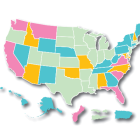
Ohio Juvenile Sex Offender Ruling Spotlights National Policy
|
Juvenile sex offenders in Ohio will no longer be required to register as sex offenders for life, the state’s Supreme Court ruled last week. The 5-2 decision ruled the lifetime requirement is cruel and unusual punishment, reigniting a national debate on how young people convicted of certain sexual offenses should fare under the criminal justice system. The majority opinion found certain parts of the Ohio Adam Walsh Act enacted in 2008 unconstitutional. Many states expanded laws pertaining to juvenile sex offenders following federal legislation in 2006 that sought to standardize how young sex offenders were classified and registered across the nation. “Registration and notification requirements frustrate two of the fundamental elements of juvenile rehabilitation: confidentiality and the avoidance of stigma,” Ohio Justice Paul Pfiefer wrote in the court’s majority opinion.
